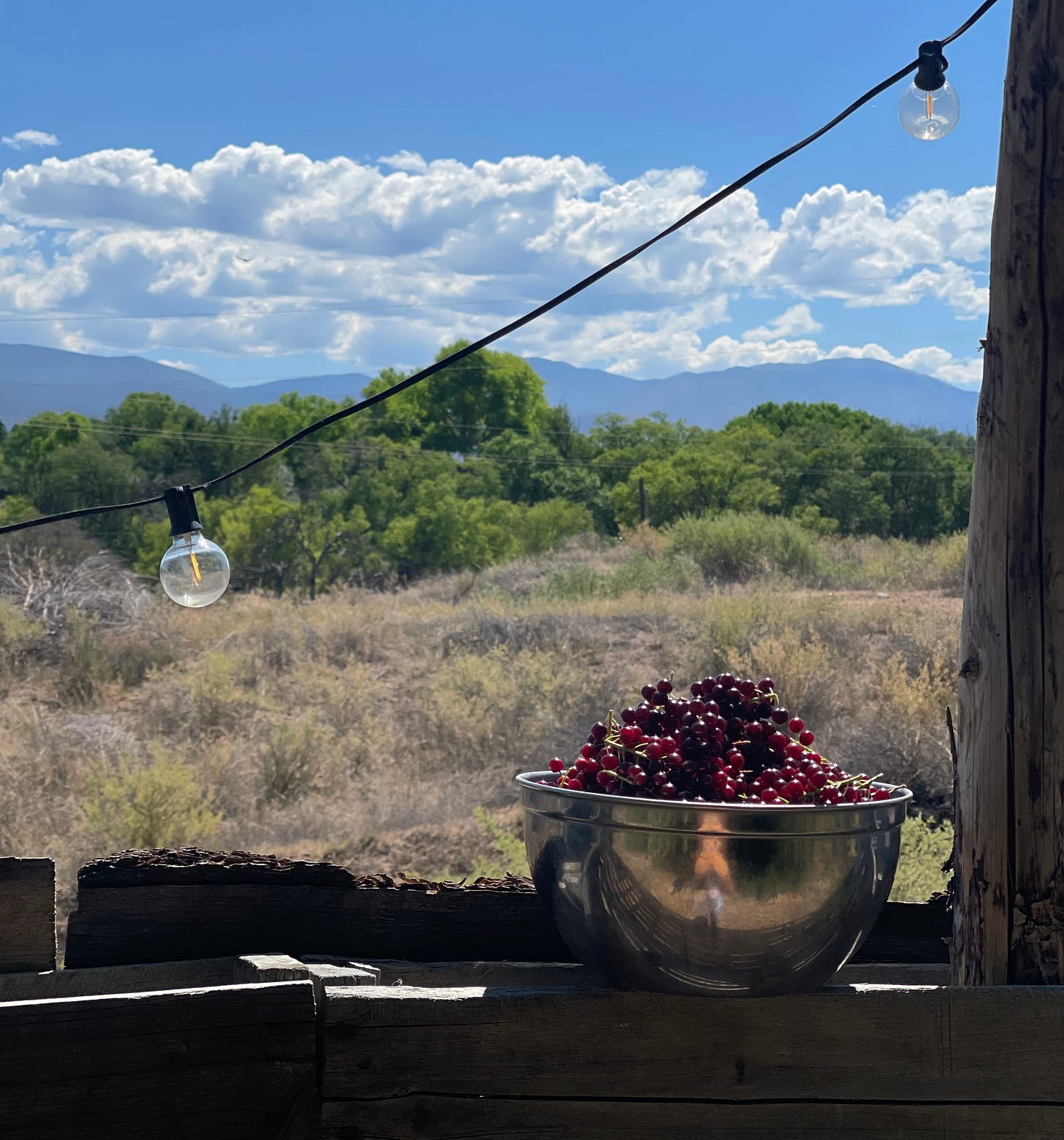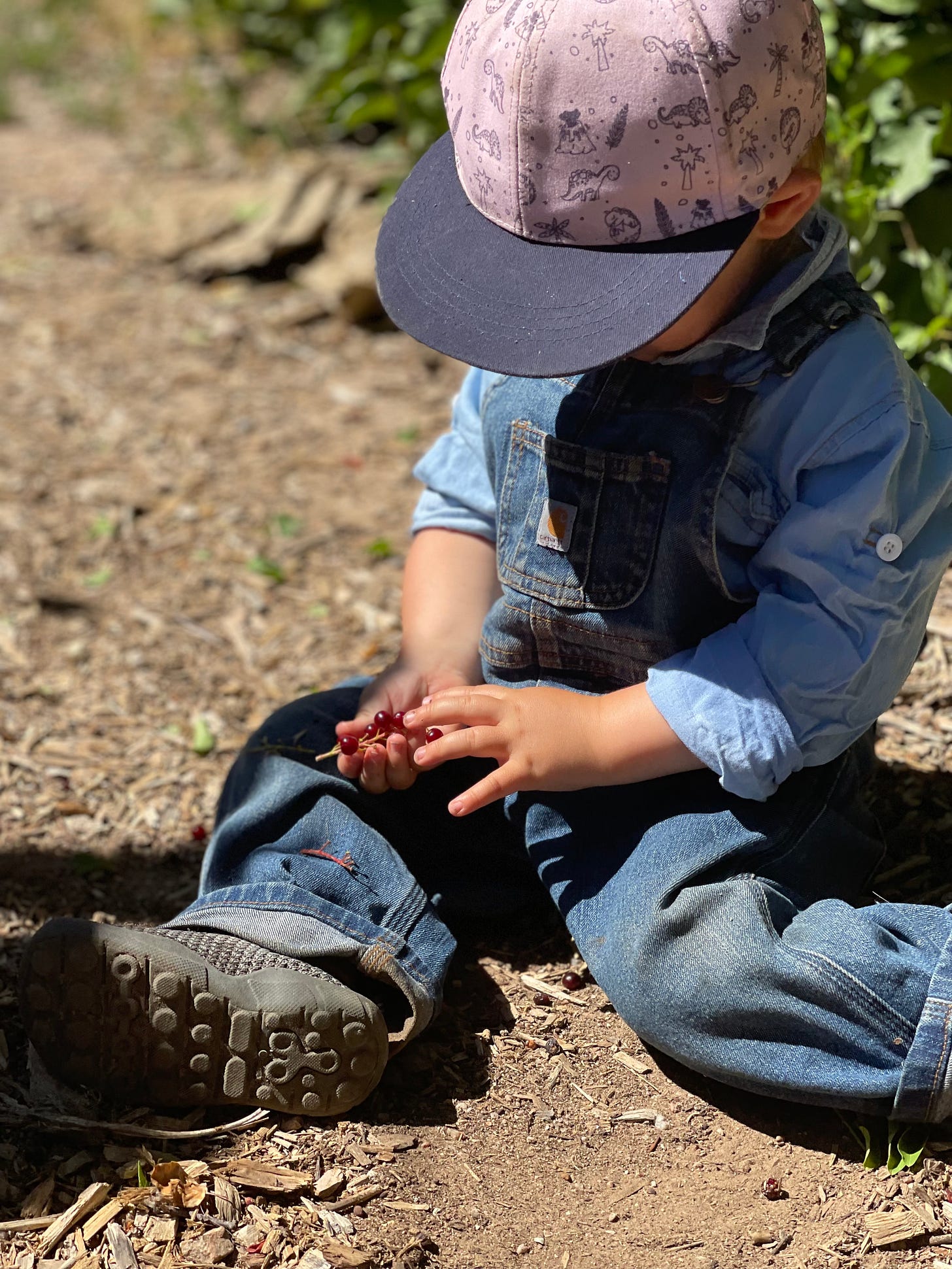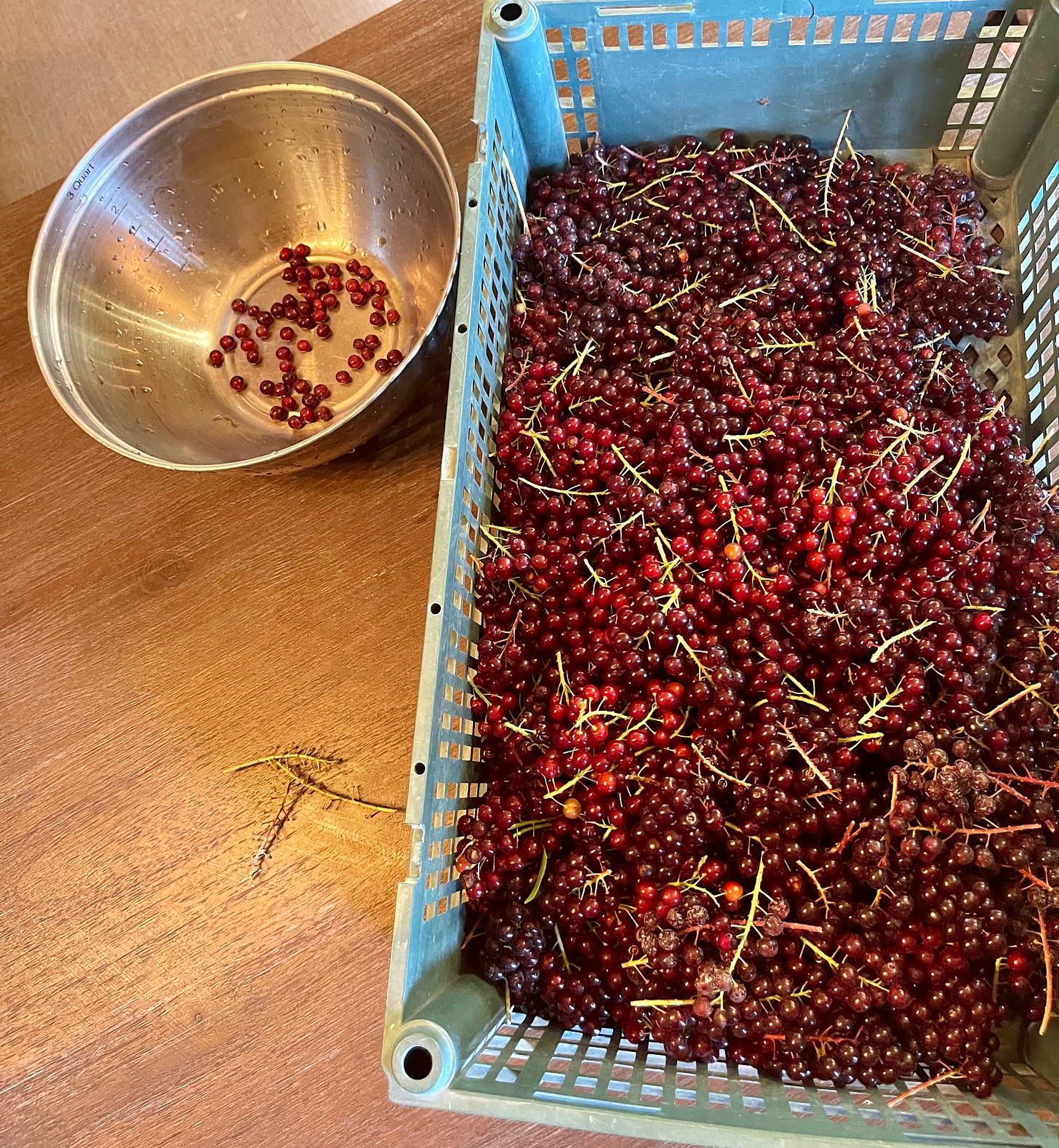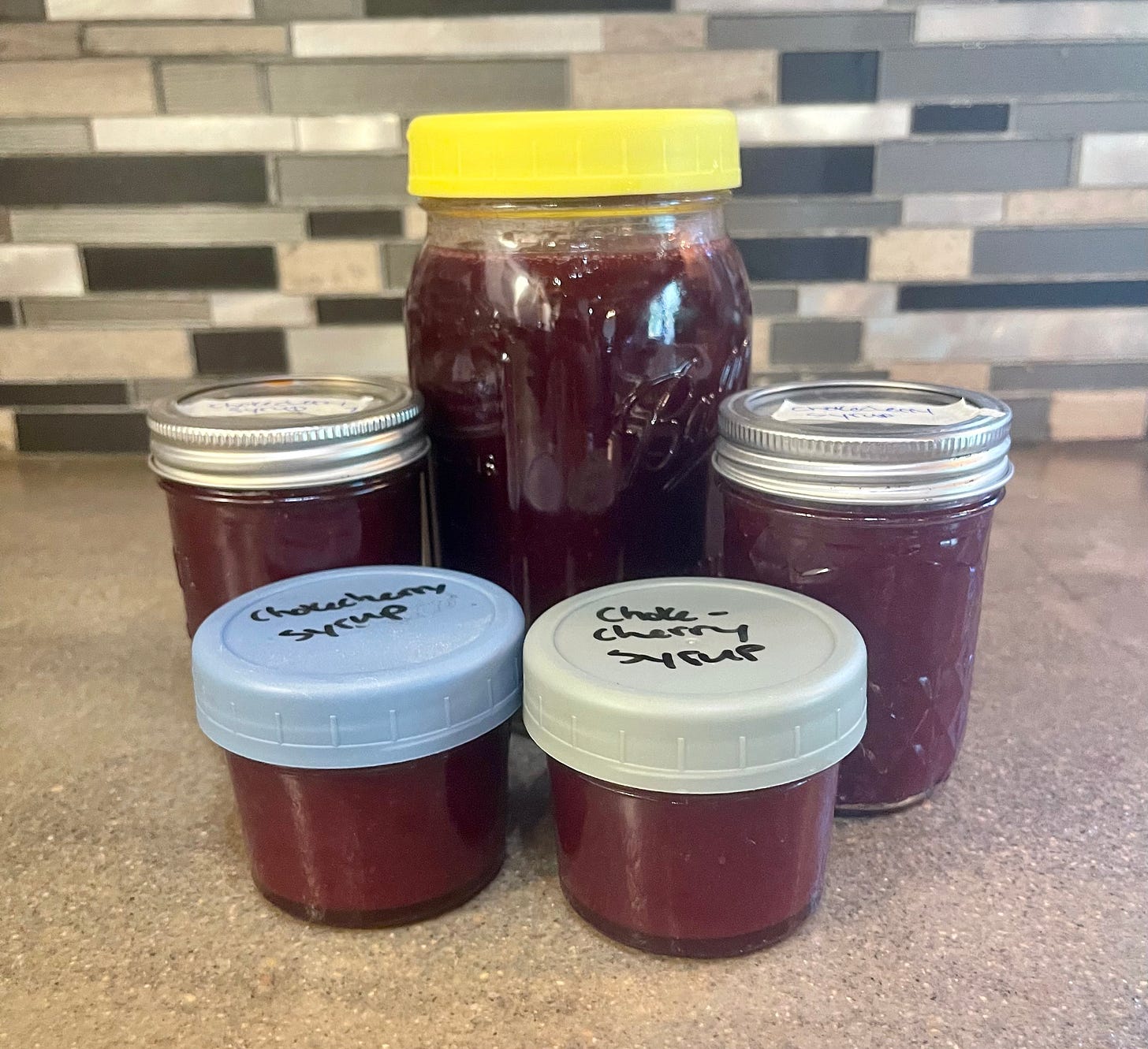The Case for Giving Your Kids Chores
Plus, how I survived a wedding in a jungle that tried to eat me alive
Ask anyone with toddlers and they’ll tell you it’s just about impossible to get anything done while you’re watching them. When they’re not swimming in the dogs’ water dish the moment you turn your back, they’re trying to climb into the toilet bowl (both true stories). So when I told my husband, Will, I was going to harvest our chokecherry trees to make syrup while watching Beckett last weekend, he wished me good luck with a smirk.
Chokecherries are notoriously a lot of work to do anything with. They have pits like regular cherries but are much smaller, so any kind of prep requires pulling hundreds of tiny berries from stems and figuring out how to remove their pits. I knew before I started that this would be an all-day endeavor.
Lately TikTok’s been targeting me with videos about giving even very young kids chores and teaching them to contribute to the family from day one. So I decided that instead of trying to occupy Beckett while I made the syrup, I’d ask him to help me with each step.
First, he helped me harvest them. I cut bunches down from the trees, gathering them in handfuls and popping them into the bowl. Every few handfuls, a bunch or two would fall to the ground, and Beckett would run to pick it up and pop it into the bowl with the rest.
After a while, he started to get fussy, so we headed inside with several buckets of fruit. Back in the house, as I started to pull each berry off the stem, I could tell Beckett was getting bored. He finally came over to me and did his sign for “up,” asking to sit at the table with me in his highchair. I plopped him in, and gave him a bunch of berries, showing him how I was pulling each one off of the branch, and putting the berries into the bowl. He mimicked me exactly.
After he cleared off his first little bunch, he threw the stem into the pile of other berry-less stems and made the signal for “more.” So I gave him another. I’m not exaggerating when I say he kept this up for nearly an hour, a record for toddlers everywhere, I’m sure.
Then, we washed, boiled, and strained them, Beckett helping to stir and smush them before I put him down for his afternoon nap. Sure, it took me longer than it may have if I’d just made the syrup myself, but letting my little dude help was fun for both of us: we got through the entire process without tears.
The next morning, I made him berry waffles with chokecherry syrup, and he ate every bite. I guess those TikTok videos are on to something.
What I’m reading
How I Survived a Wedding in a Jungle That Tried to Eat Me Alive: Nothing says “I do” like a small blood sacrifice.
I open my eyes in the misty jungle dawn, grateful to have dozed a handful of hours. Tent Dawg continues her Darth Vader breathing, perhaps dreaming of rappelling from a helicopter or choking out a python. I sit up and listen, hearing only the guttural wail of a howler monkey declaring his territory. The other tents are still.
I start to lie back down, but a tight sensation between my legs grabs my attention.
I face away from Tent Dawg, cross-legged, and peel off my underwear to inspect. Nothing. But what is that ache? I pull my right labia aside and my field of vision snaps into a tunnel.
Behold my nightmare: a tick has bitten my vagina.
Read the full story on Outside.
John Deere Doubles Down on Silicon Valley and Robots: The farm-equipment giant is buying Bear Flag Robotics, which makes autonomous tractors, marking its second big tech buy in four years.
Revenue from agricultural robots is expected to grow 19 percent annually between 2018 and 2026 to $16.6 billion, according to Research Drive, an analyst firm.
Increased agricultural automation could potentially affect employment. Farming still accounts for roughly 2.6 million US jobs, according to figures released by the US Department of Agriculture in October 2020.
But Ali Moghimi, an assistant professor at UC Davis who teaches “precision agriculture,” says robotics and AI are likely to be adopted more slowly in agriculture than other industries because of the complexity and the cyclical nature of farming. But he believes automation is inevitable, not only because it can increase productivity but also because it can help limit environmental damage by, for instance, automatically detecting overuse of nitrogen fertilizer.
New Glut City: The city’s mega-office landlords are panicking, pivoting, and shedding what’s worthless. One opens his books.
“We’re crossing a chasm,” Rechler told me when I visited him at his office at 75 Rockefeller Plaza in early June. More than any of the city’s other major landlords, he’s been warning of what he calls a “slow-moving train wreck.” Like it or not, everyone suffers if banks collapse. And if you are a New Yorker, you have a great deal at stake in the market because of the enormous public revenue offices generate — 21 percent of the city’s property-tax levy — money that goes to pay for schools, public housing, fire trucks, pensions, parks, and so much else that makes life in New York tolerable.
Read the full story on Curbed.
Karlie Kloss: ‘Postpartum, My Mental Health Was Extremely Vulnerable’: Here, the model opens up about her postpartum struggles, her reproductive and maternal health advocacy, and why she's backing Glamour's #passpaidleave campaign.
“[Childbirth] is such a universal experience,” she continues. “This is how we all come into the world. But the fact that there’s not policy in place that protects women or birthing people going through this period is something that is really devastating in this country. Now is the time to really bring this to the forefront. This is something that everybody should care about.”
Read the full story on Glamour.








